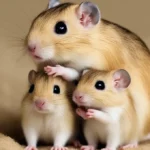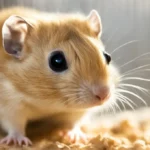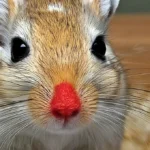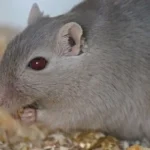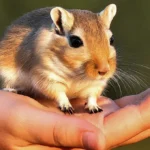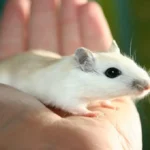Gerbils, with their inquisitive nature and playful demeanor, make fascinating pets. However, one aspect of their behavior often leaves pet owners bewildered and sometimes horrified: infanticide. Why would a mother gerbil turn on her offspring, engaging in what seems to be a cruel act of nature?
This article delves into the reasons behind this behavior, shedding light on the survival instincts that drive such actions and offering insights into the maternal instincts of these small rodents.
Understanding Gerbil Infanticide
Infanticide, while a disturbing concept, is not uncommon in the animal kingdom, and gerbils are no exception. This behavior can be attributed to several factors, ranging from environmental stresses to the innate drive for survival.
Stress and Environmental Factors:
Gerbils, like many other animals, are highly sensitive to their environment. Changes in their habitat, whether due to overcrowding, lack of resources, or even the presence of predators, can induce significant stress. This stress can trigger a mother gerbil to commit infanticide, as a drastic measure to reduce the demand on scarce resources or to prevent the weak from attracting predators.
Nutritional Needs and Survival Instincts:
In some cases, the harsh reality of survival instincts comes to the forefront. A mother gerbil may resort to eating her offspring to reclaim some of the nutrients lost during pregnancy and nursing. This act, though brutal, is a survival strategy that ensures the mother has enough resources to survive and care for the remaining litter.
Illness and Weak Offspring:
Mother gerbils are instinctively tuned to the health and viability of their babies. Offspring that are ill or show signs of weakness may be killed and consumed by the mother. This behavior is thought to be a natural mechanism to prevent the spread of disease and to focus care on the offspring with the best chance of survival.
Overcrowding and Resource Management:
In the wild, resources are often limited. Overcrowding can lead to intense competition for food, water, and shelter. A mother gerbil may engage in infanticide as a grim form of population control, ensuring that the resources available are sufficient for the strongest of her litter to survive.
Why Mother Gerbils Eat Their Babies?
The concept of maternal infanticide is complex and is influenced by a combination of instinctual and environmental factors.
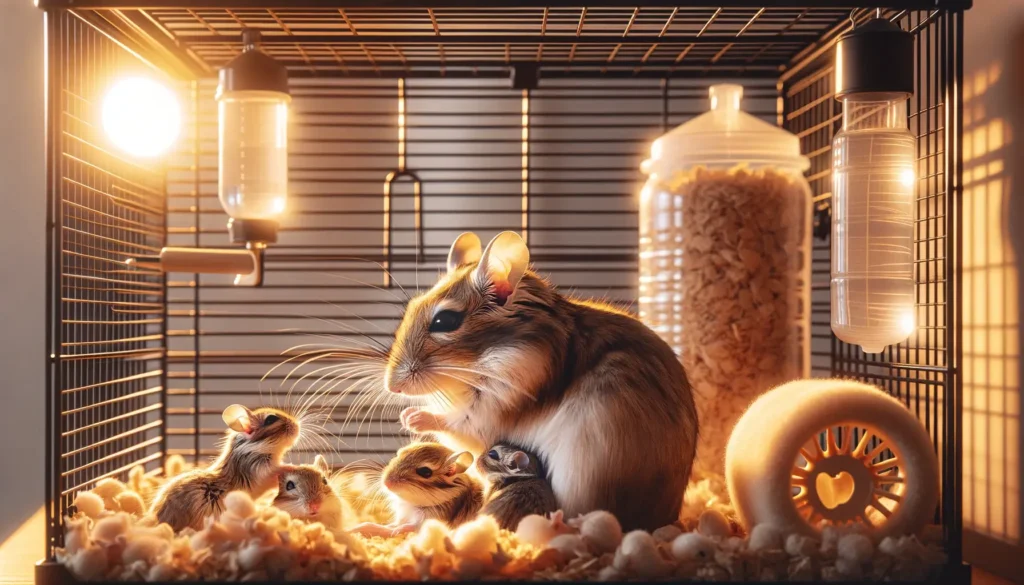
Protection Against Predators:
One of the primary reasons a mother gerbil may eat her offspring is to protect the nest from predators. The death of a pup, whether natural or otherwise, can attract unwanted attention from predators. By consuming the deceased, the mother is effectively removing any scent trails that could lead predators to her living offspring.
Ensuring the Survival of the Fittest:
Nature is unforgiving, and only the strongest survive. This principle is evident in the behavior of mother gerbils, who may commit infanticide to ensure that only the healthiest and strongest of her litter proceed to adulthood. This selective process ensures that her genetic legacy is carried on by the fittest.
Comparison with Other Rodent Species:
While infanticide is observed in many rodent species, the context and reasons can vary significantly. Unlike hamsters, which may exhibit stress-induced infanticide, gerbils’ reasons are more closely tied to environmental pressures and survival strategies.
Impact of Domestication on Infanticide Behavior:
Domestication has done little to curb the instinctual behaviors of gerbils, including infanticide. However, understanding these behaviors and providing an optimal environment can reduce the occurrence of such events in captivity.
Understanding the natural instincts and behaviors of gerbils, including the distressing act of infanticide, is crucial for any pet owner. By providing a stable, stress-free environment and managing breeding responsibly, we can minimize the factors that lead to such behaviors, ensuring the well-being of these fascinating creatures.
Preventing Infanticide in Captivity: A Guide for Gerbil Owners
While the act of infanticide among gerbils can be distressing, understanding the underlying causes provides valuable insights into preventing such occurrences in a domestic setting.
By creating a conducive environment and managing breeding carefully, gerbil owners can significantly reduce the risk of infanticide.
Providing Adequate Space and Resources:
One of the most effective ways to prevent stress-induced infanticide is by ensuring that your gerbils have ample space. Overcrowding can lead to competition for resources, which is a significant stressor for gerbils. A spacious enclosure with plenty of food, water, and nesting materials can help create a sense of security and abundance, reducing the likelihood of infanticide.
Minimizing Stress and Environmental Changes:
Gerbils are sensitive to changes in their environment. Sudden changes in lighting, temperature, or even the introduction of new pets can cause stress. Maintaining a consistent environment, gradually introducing changes, and providing hiding spots can help minimize stress levels in gerbils.
Monitoring Health and Well-being of Offspring:
Regularly monitoring the health of gerbil pups can help identify any issues early on. If a pup appears weak or ill, consult with a veterinarian to assess the best course of action. Early intervention can prevent the mother from resorting to infanticide as a means of eliminating weak offspring.
Importance of Selective Breeding Practices:
Responsible breeding practices are crucial in preventing infanticide. By carefully selecting which gerbils to breed, owners can avoid genetic issues and health problems that might lead to infanticide.
Understanding the genetic history and temperament of breeding pairs can also play a significant role in ensuring the health and well-being of the offspring.
FAQs
Do male gerbils also participate in infanticide?
While infanticide is more commonly associated with mother gerbils, male gerbils can also exhibit this behavior, especially in cases of stress or when they are not the biological father of the pups.
How common is infanticide among gerbils?
Infanticide is relatively rare in well-managed domestic settings. However, it can occur under certain conditions, such as high stress, illness, or environmental pressures.
Can infanticide be prevented in domestic gerbils?
Yes, by providing a stable, stress-free environment, adequate resources, and engaging in responsible breeding practices, the likelihood of infanticide can be significantly reduced.
What should I do if I witness infanticide in my gerbils?
If you witness infanticide, it’s essential to assess the environment and conditions in which your gerbils are kept. Make necessary adjustments to reduce stress and consult with a veterinarian for further advice.
Conclusion
Understanding the natural instincts and behaviors of gerbils, including the distressing act of infanticide, is crucial for any pet owner. By providing a stable, stress-free environment and managing breeding responsibly, we can minimize the factors that lead to such behaviors, ensuring the well-being of these fascinating creatures.
Remember, the key to a healthy gerbil colony lies in understanding their needs and behaviors, allowing us to create a nurturing environment that promotes the health and happiness of these delightful pets.



